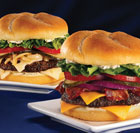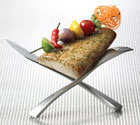
“I have yet to feed the Vegan Crab Style Cake to people and have them suspect it is not crab cake,” notes Bill Neilson, president of Multy Grain Foods.
For students entering college life, vegan options become a much greater issue. According to a 2006 study by foodservice provider Aramark, 24% of college students report that vegan options on campus are important to them. Unfortunately, many of the personnel at these campus dining services are inexperienced with vegan foodstuffs, and frequently, the challenge for companies seeking to place their products in these locations is simply communicating the proper means of preparation, explains Bill Neilson, executive chef and president of Multy Grain Foods, winner of Prepared Foods’ 2007 Spirit of Innovation Award: Foodservice.
According to Neilson, several proteins are used in Multy Grain’s Vegan Crab Style Cake: wheat, soy and pea. He reasons that his early foodservice clients did not understand the product. “They thought they were working with chicken. This does not work like that. You need to over-season it a little bit, but just to the right point where the product is not over-flavored.
“If you are starting with the raw ingredient, you need to cook it to a certain temperature, in order to [clean it and cool it and bring it down to a certain temperature], so that you can further process it and work with the product,” he notes. “A lot of [campus dining personnel] couldn’t. Even though I had given them the product, they were not able to flavor it. I told them, ‘Take your crab cake recipe, and you’ll have a crab cake,’ and they couldn’t do it.” To help his customers, Neilson says he frequently demonstrates the proper way to use the product.
Such devotion to working with the end user and explaining the nuances of flavor creation is one of the many aspects of the Vegan Crab Style Cake that helped the company garner this year’s Spirit of Innovation Award.

Try for a Little Understanding
As with any radical new product, it required some modifications and augmentations along the development process. Neilson recalls 10 years lapsed between finding the protein combination and the end product hitting the street. “We worked with a manufacturer/supplier [in creating the binding agent, a vegan mayo],” Neilson explains. “I’m working on a proprietary label from them with the product. They actually did the work [on the mayo]: I sent them a sample, and they did the work and sent samples back to me, samples which met all of the goals for vegan and vegetarian, while providing that binding agent that was needed. I’ve been working on it for some time.” Along the way, Multy Grain broke new ground in terms of test marketing.“I’ve been a member of the Association of Correctional Food Service Affiliates (AFCSA) for a number of years,” notes Neilson, “and we found that the majority of inmates [interested in vegetarian foods] are Muslim. [The Vegan Crab Style Cake] meets all of the religious criteria for both kosher and halal, partly because it is vegan and vegetarian.” As he relates, the correctional environment gave Multy Grain an opportunity to refine the “seafood cake,” as it is known in those markets.
“Some of our biggest customers, though, are at colleges and universities around the country. We sell it to them as a crab-style cake, and the interest among colleges is huge: 24% of the students at the University of Pennsylvania are vegetarian,” Neilson estimates. “We are in 30 to 40 schools, and there is a huge market for us out there. We are mostly in the Northeast, but also the University of Florida.”
End Justifies the Means
Getting into those locations has proven quite difficult, he notes, and therefore, he goes “right to the end user, to the college or the university, and I show it to the executive chef there,” no small task considering Multy Grain is a three-person company.
“I handle the marketing,” Neilson explains. He also handles the product formulation. “I take all of the ingredient products and put it all together. Then, Mike Boggs handles the nutritionals, and Winter Eveland works with the flavor companies and the manufacturers. I come back in, and we formulate that ‘homemade’ product as a foodservice manufacturing item. Then, we use co-packers to pack our products.”
The product is far from the only of Multy Grain’s offerings. Also among the mix are vegan gluten-free hot dogs, bologna, salami, a poultry roll (suitable in turkey or chicken applications), vegan crumbles, cheese steaks (beef and chicken flavored), meatballs and a host of others. The Crab Style Cake, however, seems to be the company’s key means of differentiation from its competitors, believes Neilson. “We have differentiated ourselves from anybody in the industry…I have looked for a crab cake made out of the proteins that we are using. Others are making similar products out of tofu and things like that, but it does not have the texture that [Multy Grain’s] has.”
Neilson first began selling the protein to universities, where it was incorporated into salad, stir-fry and a la king applications, but none were using it as a crab cake. As the old saying goes, necessity often really does breed innovation: “I took the protein and made a crab salad out of it, and I took the crab salad and made a crab cake out of it…I sell the universities one product that they could put on their menu for multiple products. However, some of them do not have the time or expertise to make the finished crab cake, so I produce the finished crab cake for them and furnish it to them.”
The Vegan Crab Style Cake is marketed under the Barefoot Farms brand to foodservice accounts. However, the product will not be a solely foodservice product for long: Neilson has plans for a retail variety “within the next four to five months.”

Spirit of Innovation Awards: Foodservice, Second Place Wrapping It Up
Restaurant operators are continually faced with labor issues, and foodservice manufacturers have responded to this need with innovative efforts that remove some of the back-of-house preparation steps. Phillips Foods introduced Perfectly Seasoned Fish to address this need. The items deliver on-trend flavor profiles and popular fish varieties.The company uses premium-quality tuna and mahi mahi, then applies what it calls a “flavor sheet” with a patented flavor transfer technology. Phillips' flavor sheets were developed in-house and are paper-thin, food-safe film coated with a customized blend of seasonings. These adhere using an edible, natural adhesive. As Joanna Phillips, the company’s director of marketing, explains, “Once the flavor sheets are applied to the surface of the protein, the flavor transfer begins, penetrating the surface of the fish up to a millimeter deep and effectively marinating the fish right in the package. The fish portions (fillets and steaks) are vacuum packed and flash frozen to lock in the flavor; once they arrive at the restaurant, the cook simply has to thaw, cook, remove the film and serve.”
The product features two flavor profiles: White Wine and Herb Mahi Mahi and Citrus Peppercorn Ahi Tuna Steaks. As Phillips notes, the flavor-transfer technology allows for the creation of signature seasoning blends for different locations, regions and customer demographics. “Additional spice/seasoning mixes featuring a wide range of ethnic flavor profiles and global combinations are in the works for application to any desired fish or other protein,” she notes.
Spirit of Innovation Awards: Foodservice, Third Place Upscale Backyard
Developers at Jack in the Box were looking to combine upscale with down-to-earth elements and created a Sirloin Burger that mixes all the comfort and taste profiles of a “backyard-style” burger with the high quality of sirloin.Each patty has a crumbly “hand-packed” texture, as well as a savory internal seasoning and, during cooking, a topical application of seasoning is added. Also helping to give the burger an upscale appearance and flavor is the bun: Jack in the Box’s Sirloin Burger features a slightly sweet, bakery-style bun and a savory peppercorn mayo sauce—in addition to fresh produce toppings. The company notes it is the first 100% sirloin burger offered by a major fast-food chain.
"When consumers hear 'sirloin,' they know they're getting a premium product," explains Teka O'Rourke, director of menu marketing for Jack in the Box Inc. "Our 100% Sirloin Burger elevates our menu and raises the bar for the quick-serve industry."
With the product, Jack in the Box took upscale burgers in a different direction. While its competitors have introduced various versions of burgers featuring Angus beef, Jack went the sirloin route and has added a number of sirloin-based menu items since. These include a Sirloin Steak & Egg Burrito and a Steak 'n' Cheddar Ciabatta sandwich.
